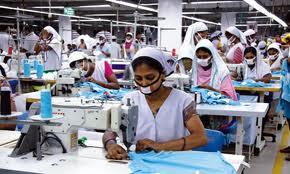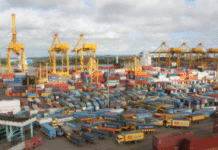Amid speculations that the European Union (EU) might withdraw its trade benefit, the 28-member economic bloc on Sunday cleared its position saying they are not considering ‘any changes’ in this trade benefit now Bangladesh enjoying in the vast EU market.
“So, in the question of GSP, at the moment we’re not considering any change to GSP,” head of the EU delegation to Bangladesh William Hanna told a select group of journalists at his office.
The envoy said Bangladesh currently benefits from the most favourable conditions for its trade and goods from Bangladesh enter into the EU market without any tax and restriction. “And that continues to be the case…so, we’re not considering any trade measures at this stage,” Hanna added.
Referring to the statement of the High Representative of the EU for Foreign Affairs Catherine Ashton after the January 5 election and a recent resolution adopted in the European Parliament, the EU envoy said neither of the two documents mentioned the ‘question of trade’.
Hanna also touched upon the issues – the Sustainability Compact adopted by the European Union and private sector initiatives like the Accord on Fire and Building Safety in Bangladesh and the Alliance for Bangladesh Worker Safety.
He said the sustainability compact was very much based on the ILO recommendations to ensure freedom of associations for workers, factory inspections and proper database on the RMG factories apart from improving working conditions.
“Those commitments entered into…we’ve been following very closely with the government…I think a number of measures have been put in place,” Hanna said.
On the progress, he said more needs to be done and the recruitment of inspectors was not as quick as it was expected and committed.
Meanwhile, the database of the information about factories has not yet been properly set up. “But there’s progress as well. We’ll continue to follow that and we’ll continue to talk with the government and other partners with the ILO to ensure that those measures were put in place.”
Hanna said they will, probably, be having a review within the next couple of months on the steps taken so far in line with the sustainability compact.
The EU is the biggest trading partner of Bangladesh and over 50 percent of Bangladesh’s annual export goes to the EU market.
Bangladesh exported garment products worth $12.57 billion to the EU in fiscal 2012-13 and $11.38 billion in fiscal 2011-12, according to data from Export Promotion Bureau.
Meanwhile, the EU has already revised the trade scheme to help the developing countries, including Bangladesh, which came into effect on January 1.
Ninety countries, including nine, in Asia will receive preferences under the reformed GSP (Generalized System of Preferences) under the Everything but Arms (‘EBA’) scheme, according to the EU website.
On Thursday, the European Parliament (EP) adopted a resolution on Bangladesh and ‘sincerely’ regretted the fact that the Bangladeshi Parliament and the political parties did not manage to agree on an inclusive mechanism for the elections.
It called on the government and the opposition to put the best interests of Bangladesh first as a matter of urgency and to find a compromise.
The EP also urged BNP to ‘unequivocally’ distance itself from Jamaat-e-Islami and Hafezat-e-Islam in the interest of Bangladesh’s future.
Stressing that the parties which turn to terrorist acts should be banned, the European Parliament strongly condemned the killings and widespread violence which erupted throughout the country in the run-up to and during the January elections.
Source: UNBConnect












